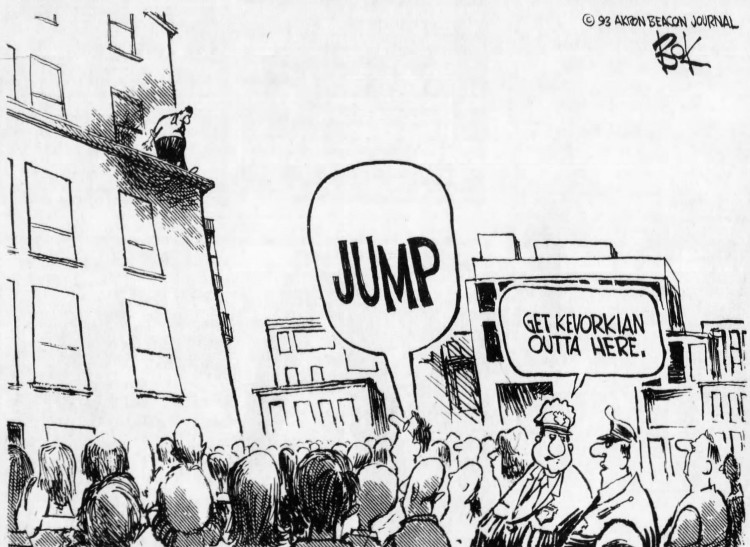The term (Dr.) Kevorkian is used to denote a purveyor of doom, especially an agent of death, a force of suicide.
It refers to Jack Kevorkian (1928-2011), known as Dr. Death, a U.S. physician and advocate of assisted suicide who rose to fame—or to infamy—through his assistance in the suicides of more than a hundred persons, many of whom were terminally ill. He first gained national attention when in June 1990 he enabled Janet Adkins of Portland, Oregon, who was fifty-four years old and in the early stages of Alzheimer’s disease, to kill herself by using his suicide machine.
Max Boot, staff writer of The Christian Science Monitor, quoted a use of the term Dr. Kevorkian in Republican Right Wing Gathers To Bash Clinton, Look to 1996 [note 1], published in The Christian Science Monitor (Boston, Massachusetts) of Monday 22nd February 1993:
Washington
Conservative eyes are smiling.
At first it might seem strange that the right wing of the Republican Party should have anything to be happy about. After all, a Republican president [note 2] lost the last election, giving the Democrats control of both ends of Pennsylvania Avenue for the first time in a dozen years.
But the 1,100 activists – a record number – who gathered here this weekend for the 20th annual meeting of the Conservative Political Action Conference (CPAC) could not be happier if the Gipper himself, Ronald Reagan [note 3], were allowed to run for a third term as president.
The cause of their satisfaction? President Clinton’s economic package. Conservatives of all shades and stripes came together in expressing resounding and unequivocal rejection of what they call “tax and spend” policies.
[…]
From Patrick Buchanan, columnist and erstwhile presidential candidate [note 4]:
“Clinton’s program is the son of [former budget director] Dick Darman [note 5], the Dr. Kevorkian of the Bush administration.”
The very same metaphor appeared in The Detroit News and Free Press (Detroit, Michigan) of Saturday 27th February 1993:
MAKING MOST OF CLINTONOMICS:
Former Budget Director Richard Darman, the Dr. Kevorkian of the Bush administration, has accepted the position of managing director for the Carlyle Group, a Washington-based investment firm. His investment specialties reportedly will include health care, the environment and transportation. The Carlyle Group can only hope he does better for them than he did for his former boss, who is now in, er, enforced retirement.
In fact, the term (Dr.) Kevorkian has often been used as a derogatory political appellation. This is another example, from a column by William Rusher, published in The Daily Advertiser (Lafayette, Louisiana) of Saturday 20th November 1993:
Ed Rollins is the Dr. Kevorkian of politics
Well, Ed Rollins has struck again. Rollins is the Dr. Kevorkian of campaign managers – he helps candidates commit political suicides.
The following use of the term Dr. Kevorkian is from The Record (Hackensack, New Jersey) of Thursday 15th September 1994—Allan Huber ‘Bud’ Selig (born 1934), Acting Commissioner of Baseball, had just put an end to the Major League Baseball strike by cancelling the remainder of the season as well as the World Series:
On Sept. 14 — 34 days after the players were driven to strike — the Dr. Jack Kevorkian of baseball, Bud Selig, turned on his suicide machine and called an end to the season.
Ray Magliozzi (born 1949) used the term Kevorkian in a light-hearted metaphor at the end of the reply to a person named Bill, in the car-advice column that he co-wrote with his brother Tom Magliozzi (1937-2014), published in several U.S. newspapers on Saturday 19th July 1997—for example in The Dispatch (Moline, Illinois):
Dear Tom and Ray:
The first car I drove in 1978 was a Saab with a two-stroke, slant-three engine. […] My father still owns this masterpiece. Would you guys refuse to work on it if it rolled into your shop? And most important, what kind of prayer would you recommend before shooting it between the headlights?—Bill
[…]
Ray: And for the record, we don’t condone shooting a car between the headlights. That’s undignified. When the time comes, we simply recommend making an appointment at Kevorkian Motors.
Howard Rosenberg used the term Kevorkian to create a very interesting metaphor in Reviving Argument for Televised Executions, published in the Los Angeles Times (Los Angeles, California) of Wednesday 2nd December 1998—ten days earlier, on 22nd November, the CBS News program 60 Minutes had broadcast a videotape of Jack Kevorkian giving a lethal injection to a weakened Michigan man who sought it because of his advanced Lou Gehrig’s disease and his expectation of an agonising death:
“60 Minutes” has always been a sort of wonderful pain in the butt, at once irresistible and irritating. On this night, it was its own Kevorkian, for one shimmering moment releasing TV from torturous conventionality—a timid existence within indelible lines—to a finer place that challenged viewers with alternatives and shaped a healthy national debate about so-called mercy killing.
This satirical cartoon was published in The Detroit News and Free Press (Detroit, Michigan) of Saturday 27th February 1993. A suicidal man is standing on the cornice of a building, looking down; a voice from the crowd of people looking up at him cries “Jump”; one policeman says to the other “Get Kevorkian outta here.”:

NOTES
1 The U.S. Democratic statesman William Jefferson Clinton (born 1946) was the 42nd President of the United States from 1993 to 2001.
2 The U.S. Republican statesman George Herbert Walker Bush (born 1924) was the 41st President of the United States from 1989 to 1993.
3 The U.S. Republican statesman Ronald Wilson Reagan (1911-2004) was the 40th President of the United States from 1981 to 1989.
4 Patrick Joseph Buchanan (born 1938) is an American paleoconservative political commentator, columnist, politician and broadcaster. He sought the Republican presidential nomination in 1992 and 1996.
5 Richard Gordon Darman (1943-2008) was an American businessman and government official. He was Director of the Office of Management and Budget from 1989 to 1993 under President George H. W. Bush.
